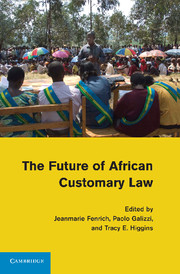Book contents
- Frontmatter
- Contents
- Notes on Contributors
- Acknowledgments
- Introduction
- Part One The Nature and Future of Customary Law
- Part Two Ascertainment, Application, and Codification of Customary Law
- Part Three The Role and Power of Traditional Authorities
- Part Four Customary Land, Property Rights, and Succession
- Part Five Customary Criminal Law
- Part Six Customary Law, Human Rights, and Gender Equality
- 18 Customary Law, Gender Equality, and the Family
- 19 African Customary Law and Women’s Human Rights in Uganda
- 20 Women’s Rights, Customary Law, and the Promise of the Protocol on the Rights of Women in Africa
- 21 From Contemporary African Customary Laws to Indigenous African Law
- Index
- References
21 - From Contemporary African Customary Laws to Indigenous African Law
Identifying Ancient African Human Rights and Good Governance Sensitive Principles as a Tool to Promote Culturally Meaningful Socio-Legal Reforms
Published online by Cambridge University Press: 05 February 2012
- Frontmatter
- Contents
- Notes on Contributors
- Acknowledgments
- Introduction
- Part One The Nature and Future of Customary Law
- Part Two Ascertainment, Application, and Codification of Customary Law
- Part Three The Role and Power of Traditional Authorities
- Part Four Customary Land, Property Rights, and Succession
- Part Five Customary Criminal Law
- Part Six Customary Law, Human Rights, and Gender Equality
- 18 Customary Law, Gender Equality, and the Family
- 19 African Customary Law and Women’s Human Rights in Uganda
- 20 Women’s Rights, Customary Law, and the Promise of the Protocol on the Rights of Women in Africa
- 21 From Contemporary African Customary Laws to Indigenous African Law
- Index
- References
Summary
“The German experience should be regarded as a lesson. Initially, after the codification of German law in 1900, academic lectures were still based on a study of private law with reference to Roman law, the Pandectists and Germanic law as the basis for comparison. Since 1918, education in law focused only on national law while the legal-historical and comparative possibilities that were available to adapt the law were largely ignored. Students were unable to critically analyse the law or to resist the German socialist-nationalism system. They had no value system against which their own legal system could be tested.”
- Type
- Chapter
- Information
- The Future of African Customary Law , pp. 494 - 516Publisher: Cambridge University PressPrint publication year: 2011
References
- 2
- Cited by

